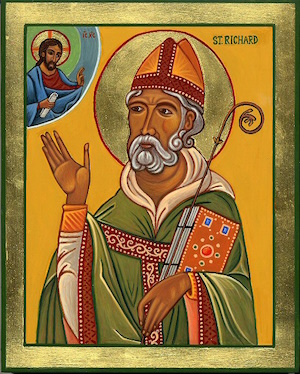
Bishop
Richard of Chichester, son of a yeoman farmer, worked on the family farm for several years, refused to marry, then went as a student to Oxford, Paris and Bologna. He became chancellor of the University of Oxford about 1235, and later, chancellor of Canterbury under Archbishop Edmund Rich.
When Henry III forced the archbishop into exile, Richard went with him to France. After the archbishop’s death, Richard studied theology and was ordained in 1243. In 1244 he was elected bishop of Chichester. King Henry III preferred a rival candidate, so he confiscated all the properties and revenues of the diocese, only returning them under threat of excommunication by the pope.
At this time England was politically unstable, which also affected the church. Many clergy, cared more for money than service, taking revenue from several dioceses without even bothering to visit them; demanding payment for sacraments and not observing celibacy. Bishops condoned this, from dishonesty, inertia or perhaps fear of the consequences of interference. But Richard’s standards were unshaken, reflecting his own devout and ordered life and he dealt firmly with any abuses that crept into his diocese.
Richard carried out his responsibilities. While the bishop’s house was closed to him, he lived in the house of a parish priest. Without the use of the diocesan horses, he moved around his district on foot, visiting fishermen and farmers. He was known to be generous and approachable, unlike most higher clergy of his day, and merciful but not weak. His knowledge of canon law and awareness of the need for reform gave him extra strength.
Richard was not only respected, he was loved and revered. He was canonised in 1262. His shrine at Chichester Cathedral became a centre of pilgrimage for many. Henry VIII had Thomas Cromwell order the destruction of Richard's shrine in Chichester cathedral in 1538. The first collect for Richard’s day is modelled on the beautiful prayer that Richard composed:
BORN: 1197,
Worcestershire, England
DIED: 3 April 1253, Dover, England
 Welcome
Welcome Calendar
Calendar Today's Word
Today's Word Lauds
Lauds Terce
Terce Sext
Sext None
None Vespers
Vespers Compline
Compline Matins
Matins